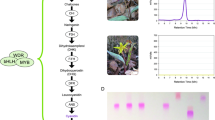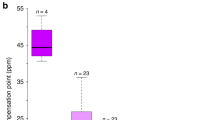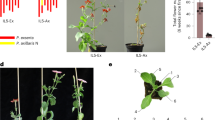Abstract
IN Britain the melanic form insularia of the moth Biston betularia (L.) is extremely variable and the name has been used to describe individuals almost indistinguishable from the typical pale form as well as intermediates and individuals almost indistinguishable from the extreme melanic carbonaria.
This is a preview of subscription content, access via your institution
Access options
Subscribe to this journal
Receive 51 print issues and online access
$199.00 per year
only $3.90 per issue
Buy this article
- Purchase on Springer Link
- Instant access to full article PDF
Prices may be subject to local taxes which are calculated during checkout
Similar content being viewed by others
References
Kettlewell, H. B. D., Heredity, 12, 51 (1958).
Kettlewell, H. B. D., Heredity, 9, 323 (1955).
Clarke, C. A., and Sheppard, P. M., Nature, 202, 215 (1964).
Clarke, C. A., and Sheppard, P. M., Nature, 198, 1279 (1963).
Author information
Authors and Affiliations
Rights and permissions
About this article
Cite this article
LEES, D. Genetic Control of the Melanic Form Insularia of the Peppered Moth Biston betularia (L.). Nature 220, 1249–1250 (1968). https://doi.org/10.1038/2201249a0
Received:
Issue Date:
DOI: https://doi.org/10.1038/2201249a0
This article is cited by
-
Industrial Melanism in the Peppered Moth, Biston betularia: An Excellent Teaching Example of Darwinian Evolution in Action
Evolution: Education and Outreach (2009)
-
The genetics of the Insularia forms of the peppered moth, Biston betularia
Heredity (1977)
-
Melanism in Biston (Lepidoptera: geometridae) in the rural central appalachians
Heredity (1977)
-
Multivariate analysis of variation within the Insularia complex of the moth Biston betularia
Heredity (1977)
-
Genetic control of the melanic forms of the moths Diurnea fagella and Allophyes oxyacanthae
Heredity (1977)
Comments
By submitting a comment you agree to abide by our Terms and Community Guidelines. If you find something abusive or that does not comply with our terms or guidelines please flag it as inappropriate.



